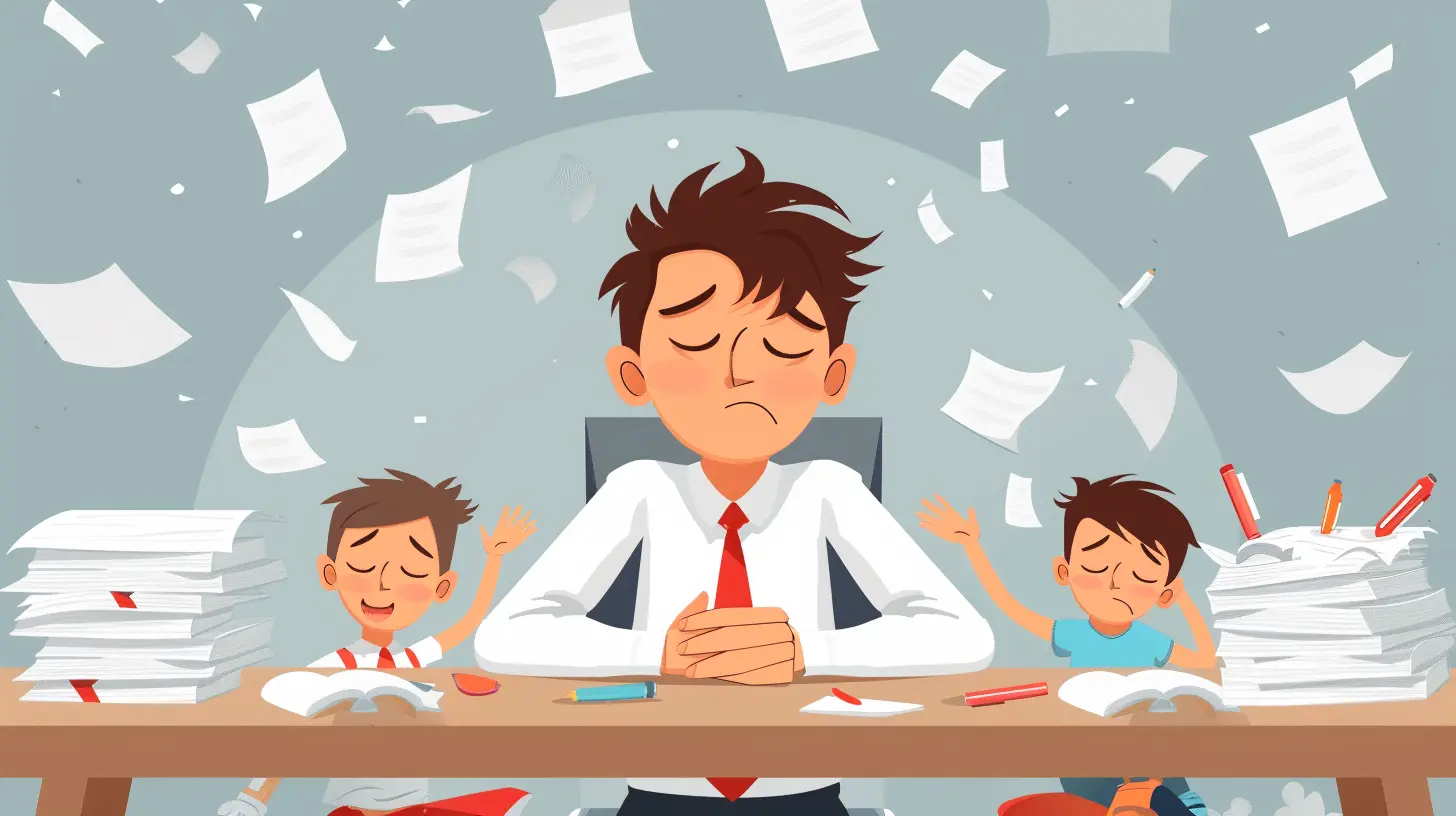Managing Stress as a Dad and Why It Matters for Your Kids
21 November 2025
Let’s be real—being a dad is awesome... but it can also be exhausting. From sleepless nights and work pressure to tantrums and financial stress, it’s a wild ride. If you're reading this, chances are, you've felt overwhelmed more than once. You're not alone, my friend.
Managing stress as a dad isn’t just about keeping your cool. It’s about being the best version of yourself—for your kids, your partner, and for YOU. The truth is, kids are sponges. They soak up everything, including our emotional states. So when we’re chronically stressed, it doesn’t just affect us—it impacts our kids in ways we might not even notice.
Let’s unpack why managing stress matters so much as a dad, and more importantly, how you can do it.
Why Dad Stress Isn’t Talked About Enough
First off, let’s address the elephant in the room—dad stress is real, but often overlooked. Society tells us dads should be tough, unemotional, and just "deal with it." Sound familiar? Unfortunately, this cultural script keeps many dads from acknowledging their stress, let alone talking about it.But ignoring stress doesn’t make it disappear. It builds up. Like a pressure cooker without a release valve, eventually, it’ll blow. And when it does, it can take a toll on your health, relationships, and parenting.
The Ripple Effect: How Your Stress Affects Your Kids
You might think, “Yeah, I’m stressed, but I keep it to myself—my kids don’t notice.” Oh, but they do. Kids are incredibly sensitive to changes in their environment, especially emotional shifts. Even toddlers can pick up on your mood.1. Emotional Contagion is a Real Thing
Ever walked into a room where someone’s angry or anxious? You can feel it, right? Kids feel that too. When you're constantly stressed, it changes the emotional climate of the home. And the warmer the emotional temperature, the healthier the family. Chronic stress can make you impatient, irritable, or withdrawn, and kids often internalize that.2. Modeling Coping Mechanisms
Your kids are soaking up your behavior like little emotional sponges. If they see you freak out over every little thing, what do you think they’ll do when they're in a stressful situation? On the flip side, modeling calm, healthy responses teaches them resilience.3. Impacts on Attachment and Bonding
Believe it or not, high stress can interfere with the parent-child bond. Stressed-out dads may become emotionally unavailable or too distracted to be present. And presence matters more than you might think—it’s the foundation of security for your kids.
Common Stress Triggers for Dads
Let’s break down what’s triggering the stress. Every dad’s experience is different, but some common culprits include:- Work Pressure: Meeting deadlines, financial responsibilities, job security—it's a lot.
- Time Crunch: Balancing work, family time, errands, and, oh yeah, sleep.
- Health Issues: Physical fatigue or not having the time to work out or eat right.
- Relationship Strain: Arguments or miscommunication with your partner.
- Dad Guilt: Feeling like you're not doing enough for your kids or being “present.”
Sound familiar? The pressure to be the provider, protector, and superhero 24/7 can be crushing.
But here’s the deal—you can’t pour from an empty cup. Period. If your mental and emotional health is running on fumes, something’s gotta give.
Signs You're Carrying Too Much Stress
Sometimes stress sneaks up on us. One minute we’re fine, the next we’re snapping at our kids for knocking over a glass of milk. Here are some red flags to watch out for:- You’re constantly tired, even after sleeping.
- Little things trigger big emotions.
- You feel disconnected from your family.
- You don’t enjoy things that used to make you happy.
- Physical signs like headaches, stomach issues, or chest tightness.
If you're nodding your head, don’t panic. You’re human. And you're not alone. Awareness is the first step toward getting back on track.
How to Manage Stress Like a Pro Dad
Now we’re talking solutions. Managing stress doesn't mean running off to a cabin in the woods (though that sounds amazing). It's about daily habits, mindset shifts, and small wins that stack up over time.1. Cut Yourself Some Slack
Perfection is a myth. You're allowed to mess up, to feel tired, to take a break. Parenting isn’t about doing everything right—it’s about showing up and trying again, and again.Give yourself permission to not have it all together. That alone can ease some of the pressure.
2. Get Moving
You knew this one was coming. Exercise is one of the best stress-busters out there. It doesn't have to be hardcore—go for a walk, shoot some hoops, do pushups in your living room. Movement shifts your physiology and releases those feel-good endorphins.Bonus: active play with your kids doubles as bonding time and stress relief.
3. Open Up
Talk to someone—your partner, a buddy, even a therapist. You’d be surprised how much simply saying “I’m overwhelmed” can lift weight off your shoulders.Remember: talking about stress doesn’t make you weak. It makes you courageous. Vulnerability is strength, especially as a dad.
4. Set Boundaries with Work
Easier said than done, right? But if work is eating up all your time and energy, something's out of balance.If possible, unplug after a certain hour. Put the phone down during dinner. Schedule actual "dad time" where you're focused only on your family. These boundaries protect both your mental health and your relationships.
5. Sleep Like It’s Your Job
Sleep is not a luxury—it’s a necessity. Lack of sleep amplifies stress, messes with your memory, and makes you more reactive.Try to get at least 7 hours. If you have a baby or toddler keeping you up, tag-team with your partner if you can. Naps aren’t just for kids—they can save your sanity too.
6. Practice Mindfulness (Without the Fluff)
You don’t need to light incense and chant (unless you want to). Mindfulness can be as simple as paying attention to your breath for a minute. Or focusing on what your kid is saying instead of thinking about tomorrow’s to-do list.Even short bursts of presence can ground you and reduce anxiety.
7. Create Your Own Recharge Routine
What fills your tank? Maybe it’s music, a quick drive, reading, or gaming. Find your “reset button” and use it often. You can’t be available for your family 24/7 without taking time to recharge.How Managing Your Stress Helps Your Kids Thrive
Alright, so what’s in it for your kids when you manage your stress?Better Emotional Connection
When you're not distracted by stress, you're more emotionally available. You connect on a deeper level. And those little moments of presence? They add up. Your kids will feel seen and safe.Healthier Home Environment
Emotional stability sets the tone in your home. A calm dad often means a calm household. It creates a sense of security and predictability—super important for growing kids.Lifelong Lessons
You’re a walking, talking blueprint for your kids. When they see you handling stress in a healthy way, they learn to do the same. You're teaching resilience, emotional intelligence, and self-care by example.What If You’re Already Burnt Out?
First—take a deep breath. Then take another. It's never too late to change things.Start small. Pick one stress-reducing habit and try it for a week. Maybe it's walking during lunch breaks. Maybe it's turning your phone off at dinner. One little shift can have a domino effect.
And if you feel like you're sinking deeper, consider talking to a mental health professional. Therapy isn’t just for crisis—it’s a tool to help you thrive.
You’re not failing. You’re figuring it out—just like every other dad out there.
Final Thoughts: You Matter, Dad
It’s easy to put yourself last. To push through and "man up." But the truth is, your well-being isn’t just about you—it’s the cornerstone of your family’s happiness and emotional health.Taking care of yourself is one of the most powerful things you can do as a dad. It makes you more patient, more present, and more connected. That’s the kind of legacy worth leaving.
So breathe. Laugh. Get some sleep. Talk to a buddy. Move your body. Be kind to yourself.
Your kids don’t need a perfect dad.
They need a healthy, human, present one—and that’s you.
all images in this post were generated using AI tools
Category:
Working DadsAuthor:

Max Shaffer
Discussion
rate this article
1 comments
Jolene McWain
As dads, managing our stress isn't just about us—it's a crucial part of setting a healthy example for our kids. Prioritizing our well-being directly impacts their emotional development and resilience. Let's lead by example!
November 22, 2025 at 3:43 PM

Max Shaffer
Absolutely! Dads who manage their stress effectively not only benefit themselves but also foster a supportive environment for their kids. Leading by example is key in nurturing their emotional growth.


